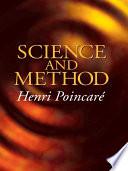Quotes from book
Science and Method

Classic account of basic methodology and psychology of scientific discovery explains how scientists analyze and choose their working facts and explores the nature of experimentation, theory, and the mind. 1914 edition.

“Sociology is the science which has the most methods and the least results.”
La sociologie est la science qui possède le plus de méthodes et le moins de résultats.
Part I. Ch. 1 : The Selection of Facts, p. 19
Science and Method (1908)

La logique nous apprend que sur tel ou tel chemin nous sommes sûrs de ne pas rencontrer d'obstacle ; elle ne nous dit pas quel est celui qui mène au but. Pour cela il faut voir le but de loin, et la faculté qui nous apprend à voir, c'est l'intuition. Sans elle, le géomètre serait comme un écrivain qui serait ferré sur la grammaire, mais qui n'aurait pas d'idées.
Part II. Ch. 2 : Mathematical Definitions and Education, p. 130
Science and Method (1908)

C’est parce que la simplicité, parce que la grandeur est belle, que nous rechercherons de préférence les faits simples et les faits grandioses, que nous nous complairons tantôt à suivre la course gigantesque des astres, tantôt à scruter avec le microscope cette prodigieuse petitesse qui est aussi une grandeur, tantôt à rechercher dans les temps géologiques les traces d’un passé qui nous attire parce qu’il est lointain.
Part I. Ch. 1 : The Selection of Facts, p. 23
Science and Method (1908)

Part II. Ch. 2 : Mathematical Definitions and Education, p. 128
Variant translation: The chief aim of mathematics teaching is to develop certain faculties of the mind, and among these intuition is by no means the least valuable.
Science and Method (1908)
Context: The principal aim of mathematical education is to develop certain faculties of the mind, and among these intuition is not the least precious. It is through it that the mathematical world remains in touch with the real world, and even if pure mathematics could do without it, we should still have to have recourse to it to fill up the gulf that separates the symbol from reality.

Part I. Ch. 1 : The Selection of Facts, p. 22
Science and Method (1908)
Context: The scientist does not study nature because it is useful to do so. He studies it because he takes pleasure in it, and he takes pleasure in it because it is beautiful. If nature were not beautiful it would not be worth knowing, and life would not be worth living. I am not speaking, of course, of the beauty which strikes the senses, of the beauty of qualities and appearances. I am far from despising this, but it has nothing to do with science. What I mean is that more intimate beauty which comes from the harmonious order of its parts, and which a pure intelligence can grasp.

“Every definition implies an axiom, since it asserts the existence of the object defined.”
Part II. Ch. 2 : Mathematical Definitions and Education, p. 131
Science and Method (1908)
Context: Every definition implies an axiom, since it asserts the existence of the object defined. The definition then will not be justified, from the purely logical point of view, until we have proved that it involves no contradiction either in its terms or with the truths previously admitted.